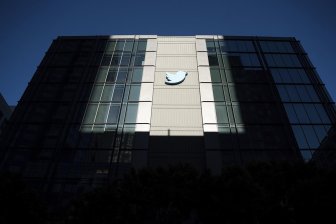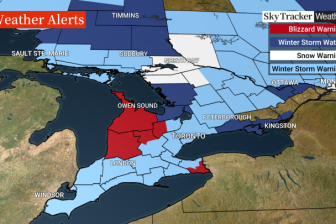Sixty-one per cent of Canadians said misinformation is more likely to spread on Twitter due to Elon Musk’s takeover, according to an Ipsos poll conducted exclusively for Global News.
The poll, done between Nov. 10 and 16, surveyed 1,001 Canadians 18 years old or older about misinformation and social media, which has been a growing concern over recent years but is receiving renewed attention since Musk completed his purchase of the social media platform.
Sixty-two per cent also said they were less likely to use Twitter as a source of information because of Musk’s acquisition.
Read more:
Twitter prohibits users from promoting Facebook, Instagram, Mastodon accounts
Read More
However, there was disagreement over whether Musk’s ownership will bring substantial change to Twitter, with 47 per cent saying they expect little change and another 47 per cent saying Twitter will become more censored.
Musk completed his takeover of Twitter on Oct. 27 and on the same day instated himself as CEO.
Since his takeover, Musk has executed mass layoffs, firing around 3,700 staff, or about 50 per cent of the company’s workforce. Recently, Musk has come under fire for quickly changing policies on the social media platform, including banning accounts that feature links to competing platforms as well as journalists who linked to an account that tracked his private jet, with Musk saying that it amounted to doxxing.
Although the poll was conducted before these latest developments, Ipsos senior vice-president Sean Simpson told Global News the shock of Musk’s takeover had a significant impact on people’s opinions. Musk has called himself a free speech absolutist and made the ability to post almost anything that didn’t cause physical harm to others a key tenet of his takeover.

Simpson also said there was strong reaction to Musk’s initial Twitter Blue plan that would allow any non-bot account to receive a blue, verified checkmark if they paid $8 a month, rather than regulating the checkmarks to accounts of officials and journalists.
The initial rollout of Twitter Blue led to a number of accounts replicating official, verified accounts, with the real and fake difficult to distinguish given they both had checkmarks.
“Canadians recognize that just because the account is verified, doesn’t mean the information contained within that account is factual,” Simpson said. “Canadians are calling BS on the checkmark.”
Musk has said he will step down as CEO of Twitter once he finds someone “foolish enough” to take the job. His decision came after he launched a poll on the platform Sunday asking if he should step down, with the “yes” option winning out. He said in a tweet that he will just run the software and servers teams once no longer CEO.
Simpson pointed out that there is a stark difference in opinion on misinformation between older and younger Canadians.
While older generations are concerned about social media’s ability to easily spread misinformation, younger people are less concerned, Simpson said, and don’t believe as much that companies should be regulated.
Rather, he said they are more media savvy in their ability to spot fake news. However, data also shows almost half of Gen Z are more trusting of information they see on social media versus traditional media, according to Simpson. He said older generations may be more altruistic and want to protect those younger from being misled, whereas younger people are saying, “I got this,” and it doesn’t need to be regulated for them.

There is agreement, though, between generations that people who spread misinformation on social media should be banned, with 77 per cent of Canadians surveyed saying so. Simpson said there has been reaction to Musk reinstating previously banned accounts, such as former U.S. President Donald Trump, that have been known to spread false information, such as Trump’s claims that there was fraud in the 2020 U.S. election.
Even though the majority believes that accounts that spread misinformation should be banned, Simpson said the ultimate internet governance question is who exactly should decide what is misinformation.
While younger people are saying that the arbiter should be themselves, those older feel there should be some authority behind it, but it is not clear what that should be, be it governments or the platforms themselves, Simpson said.
As western society becomes more politically polarized, Simpson said Ipsos research done for the Radio Television Digital News Association, a U.S.-based membership organization of media professionals, found that people are more likely to believe information that they’re receiving is fake if they don’t agree with it.
“One of the things we’re seeing in Canada over the last two years or so is the decline of social cohesion,” Simpson said. “Part of that has to do with the politicization and polarization of social media, where you’ve got groups of the far right and far left just going at each other all the time.”
Simpson said he’s not sure if more regulation, which he said could be executed differently under a right- or left-leaning government, would fix that polarization.
Meanwhile, seventy-eight per cent of Canadians polled say social media platforms like Twitter will continue to polarize and divide their users.
© 2022 Global News, a division of Corus Entertainment Inc.











More Stories
Fair share: the right office solution can take finding the right partner
Ontario faces crew shortages, aircraft issues in fight against wildfires | Globalnews.ca
Refugee attends open house at Downtown Eastside affordable housing facility – BC | Globalnews.ca